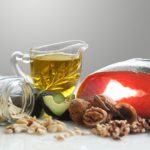Spotting Trans-Fatty Acids?
I’m confused. I see food-packaging claiming “no trans-fats,” but when I read the label, the ingredients list “partially hydrogenated oil.” I thought they were the same thing. Can you explain?
Andrew Weil, M.D. | May 26, 2023

Trans-fatty acids (TFAs) and partially hydrogenated oils are not the same, but they are related — and I recommend avoiding both of them. The terminology can be confusing, so here’s a bit of a primer on fats and hydrogenation:
Saturated fats – a chemical term that means all the carbon atoms are “saturated” with the maximum number of hydrogen atoms – are mostly (but not always) solid at room temperature. Butter, cheese and other full-fat dairy products, and coconut oil are high in saturated fats. It’s not a “good fat,” but some recent studies indicate that saturated fats probably don’t raise the risk of coronary disease as much as once was thought.
Unsaturated fats – so called because they are missing some hydrogen atoms – are the “good fats” that include olive oil, avocados, and many nuts and seeds. Unsaturated fats, which may be mono- or poly-unsaturated, are more often liquid at room temperature (olive oil, sunflower oil, flaxseed oil, among others).
Food producers who want to make a liquid product into a solid – to make it spreadable, for example — add hydrogen atoms to unsaturated fats. Products that include partially hydrogenated fats include margarine and vegetable shortening, among others. The process of hydrogenation also makes fats more stable. This extends the shelf life of the foods that contain them – principally commercial baked goods as well as other processed foods including French fries, chips, microwave popcorn and other snack foods, most frozen meals, breakfast cereals, and low-fat ice cream.
The process of partial hydrogenation also creates trans fatty acids (TFAs). TFAs increase total cholesterol, raise LDL (“bad”) cholesterol, and lower HDL (“good”) cholesterol. Beyond that, TFAs may have adverse effects on cell membranes and the immune system and promote inflammation, cancer, and aging.
Trans fats were officially banned in the United States in 2018, but a product with less than half a gram of TFA can legally be labelled as having 0 trans fats. That’s why you may see a product with partially hydrogenated oil labeled as having 0 trans fats.
Trace levels of TFAs are found naturally in milk fat (created by bacterial action in the stomachs of cows), but, even in butter, the amounts are so small that they are probably not a concern.
Partially hydrogenated oils contain mixtures of saturated, monounsaturated, and polyunsaturated fats. Even if some labels claim that foods include no TFAs, I would avoid those listing partially hydrogenated oils. They are markers of low-quality foods that are often unhealthy in other ways and have no place in the optimum diet.
There has been much confusion about fats over the past decades, with low-fat diets once recommended as being the healthiest for the heart. In fact, margarine was once touted as a healthy replacement for butter for those trying to reduce intake of saturated fats – until evidence showed that trans fats in margarine were worse than saturated fats.
A large-scale study published in The Lancet in 2022 (the CORDIOPREV study) showed that a Mediterranean diet was better for cardiovascular health than a low-fat diet. I recommend the Mediterranean diet and the latest variation, the green Mediterranean diet. You can also see my anti-inflammatory food pyramid here.
Andrew Weil, M.D.
Sources
Mozaffarian D, Rimm EB, King IB, Lawler RL, McDonald GB, Levy WC. trans fatty acids and systemic inflammation in heart failure. Am J Clin Nutr. 2004 Dec;80(6):1521-5. doi: 10.1093/ajcn/80.6.1521. PMID: 15585763; PMCID: PMC1201402. ncbi.nlm.nih/pmc/articles/PMC1201402/
Siri-Tarino PW, Sun Q, Hu FB, Krauss RM. Meta-analysis of prospective cohort studies evaluating the association of saturated fat with cardiovascular disease. Am J Clin Nutr. 2010 Mar;91(3):535-46. doi: 10.3945/ajcn.2009.27725. Epub 2010 Jan 13. PMID: 20071648; PMCID: PMC2824152. pubmed.ncbi.nlm.nih/20071648/
Jimenez-Torres J, Alcalá-Diaz JF, Torres-Peña JD, Gutierrez-Mariscal FM, Leon-Acuña A, Gómez-Luna P, Fernández-Gandara C, Quintana-Navarro GM, Fernandez-Garcia JC, Perez-Martinez P, Ordovas JM, Delgado-Lista J, Yubero-Serrano EM, Lopez-Miranda J. Mediterranean Diet Reduces Atherosclerosis Progression in Coronary Heart Disease: An Analysis of the CORDIOPREV Randomized Controlled Trial. Stroke. 2021 Nov;52(11):3440-3449. doi: 10.1161/STROKEAHA.120.033214. Epub 2021 Aug 10. Erratum in: Stroke. 2021 Nov;52(11):e754. PMID: 34372670. pubmed.ncbi.nlm.nih/34372670/
Originally Published March 2005. Updated May 2023












